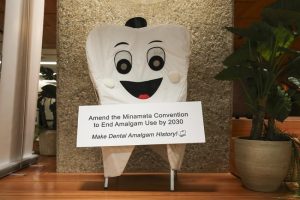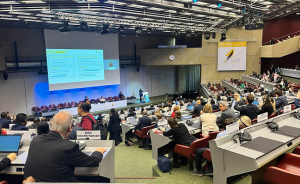The Fifth Conference of the Parties (COP5) to the Minamata Convention on Mercury commenced on Monday October 30, 2023, in Geneva, Switzerland. Primed to be a landmark event, with proposed amendments to be negotiated by Parties covering mercury-added fluorescents, dental amalgam, and cosmetic products, the summit will close on Thursday, November 2.

On the 10th anniversary of the Minamata Convention’s adoption, delegates began discussing amendments to the Convention’s Annexes to establish deadlines for adoption of mercury-free products and processes. They also considered other ways to ensure the Convention can be effective, including the question of financing and technical assistance, and action on artisanal and small-scale gold mining.
In her opening statement, Katrin Schneeberger, Director, Federal Office for the Environment, Switzerland, urged delegates to “deepen and expand” the Convention’s work.
Monika Stankiewicz, Executive Secretary, Minamata Convention, called for greater collaboration, trust building, recognition of the linkages between mercury and the climate and biodiversity conventions, and drawing on the knowledge of those most vulnerable to mercury exposure.
Regarding possible amendments to Annexes A (phaseout of products) and B (phaseout of processes), many parties in plenary indicated their support for the African Group proposals to amend both annexes. In the contact group on annex amendments, co-chaired by Lesotho and Japan, which met in the afternoon, delegates debated but did not finalise phaseout dates for new proposals in Annex A, although they came close to consensus on certain button batteries, and switches and relays. The group also added two new Annex A entries for certain types of compact fluorescent lamps.
Delegates later discussed the Convention’s financial resources and mechanism, noting that the Global Environment Facility (GEF) has increased its funding for the Minamata Convention by more than 30% in its eighth replenishment, and but that there are insufficient funds currently for the Specific International Programme to Support Capacity Building and Technical Assistance (SIP) to offer a fourth round of funding to parties. Many parties called for further funds to support critical efforts by developing countries to implement the Convention.

At the COP, BAN Toxics, a Philippines not-for-profit, made a case to end mercury pollution.
In 2020, the Philippines ratified the Minamata Convention on Mercury, a legally binding global treaty aimed at safeguarding human health and the environment from man-made emissions of mercury and mercury compounds. The environmental watchdog says it has actively engaged in treaty meetings, advocating for the reduction and potential elimination of anthropogenic uses of mercury.
“COP5 is highly significant because of the proposed amendments from the African region, and this is something that BAN Toxics is closely following,” says Jam Lorenzo from BAN Toxics’ Policy Development and Research Unit.
Several proposals from the region aim to further eliminate mercury-added products through the phase out of all fluorescent lamps, elimination of the 1 ppm threshold for skin lightening products, and the imposition of a 2030 phase-out for dental amalgam.
“In the Philippines, we have seen the development of various mercury policies and regulations from pertinent government agencies. Notably, dental amalgam use has been phased out, healthcare facilities are buying fewer mercury thermometers and sphygmomanometers, and there are signs of reduced mercury use in artisanal and small-scale gold mining. Support for the African region proposals could be significant in enhancing Convention provisions.”
As a member of the international coalition Zero Mercury Working Group (ZMWG), BAN Toxics strongly endorses the coalition’s proposals in the ongoing COP5 for a complete ban on “mercury-added” cosmetics and supports the curtailment of sales, marketing, advertising, and display of toxic mercury skin-lightening products (SLPs), among others.
“Despite current Convention provisions, mercury SLPs remain to be sold in the Philippines and worldwide. The relevance of the proposals could not be overstated in the country, where the widespread availability of illegal mercury SLPs poses significant health risks to women and girls being influenced by colonial beauty standards that favor fairer skin.”
In its market surveillance and testing using handheld devices, prohibited SLPs continue to proliferate on popular e-commerce sites and in various physical stores, with exceedingly high mercury contents, ranging from 10,000 ppm to 81,600 ppm.
ZMWG has previously highlighted the lack of effective controls in many countries to prevent the manufacture and sale of mercury SLPs, enabling online platforms to evade their responsibility of preventing the illicit sale of these products.
“Our main challenge now lies in enforcing regulations and ensuring compliance within related industries and sectors. Unlike the phase-out policy for dental amalgam, the Philippines is still currently adhering to a 1 ppm limit for SLPs. We call on a total ban of these products without the 1 ppm limit to make it easier for governments to monitor and regulate these products.”
Moving away from dangerous mercury-added products such as cosmetics, dental amalgam, and light bulbs should be our priority. BAN Toxics calls on Member States to decide for a safer future free from mercury,” added BAN Toxics.
Mercury is considered by the World Health Organisation as one of the top 10 chemicals of major concern due to its adverse impacts to human health and the environment.
